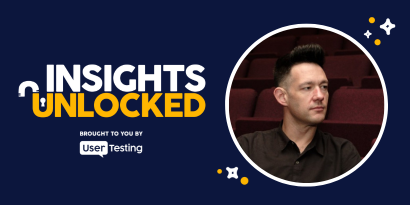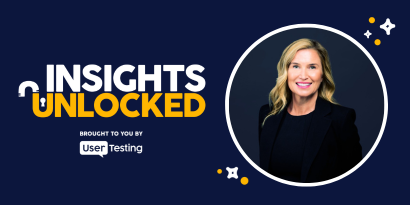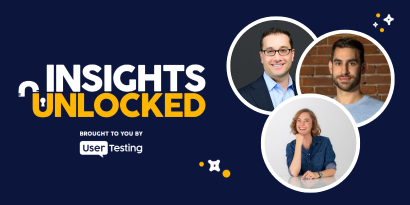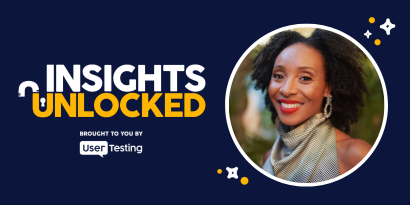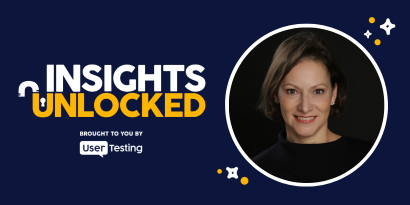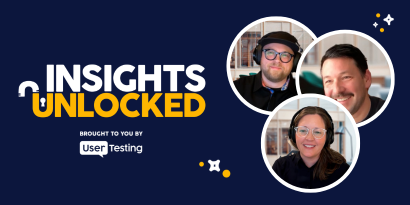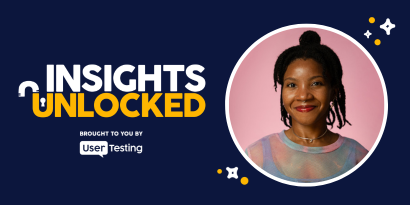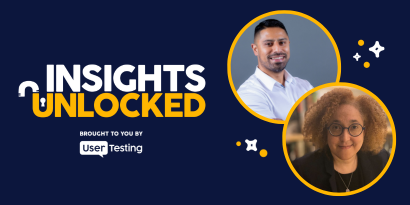
Episode 90 | September 04, 2023
Unleashing the power of research across your organization
In this week’s Insights Unlocked episode, UserTesting’s Lisa Lloyd talks with Behzod Sirjani about democratizing research, measuring research’s impact, how to tackle diversity and inclusion in research practices, and creating a go-no-go decision making framework.
Unleashing the power of research across your organization
The truth for some companies is that getting great research is inconvenient.
But for Behzod Sirjani that inconvenience only arises because those organizations are pursuing research too late in the process.
“Very often people decide to do research later than they should and that makes it feel inconvenient because there is momentum to the building cycle and then you have an intervention — we’re going to stop and go talk to people, observe a thing, do whatever it is — and that feels like you’ve thrown a wrench into the system. If you plan effectively, it doesn't look like it has to be that way.”
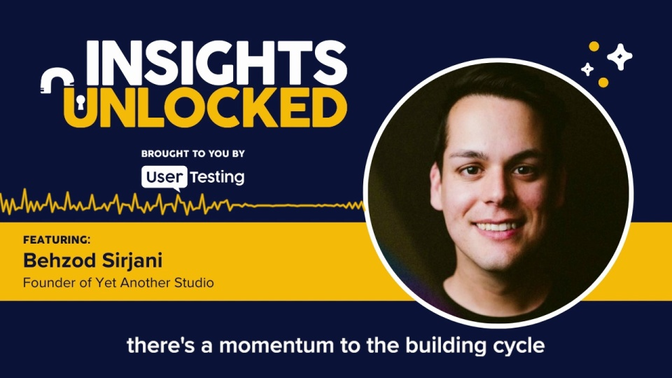
In this week’s Insights Unlocked episode, UserTesting’s Lisa Lloyd talks with Behzod about democratizing research, as well as measuring research’s impact, how to tackle diversity and inclusion in research practices, overcoming resistance to research, and creating a go-no-go decision making framework.
Behzod is founder of the Yet Another Studio consultancy, working with a range of clients including Figma and Dropbox. He is also an Executive in Residence and Program Partner at Reforge, where he built and leads the User Insights for Product Decisions program. Previously, Behzod led Research Operations at Slack and was a Senior UX Researcher at Facebook, where he co-founded the Research Associates Program.
He looked back to his time at Slack in giving an example of how pursuing great research can be challenging — for any number of reasons — but that doesn’t mean it is inconvenient.
“When I was Slack, we had a large and growing user population in India. We didn't have an office there [at the time]. We cared about this part of the market, but we didn't know anything,” he said.
So he took six people there for a week to meet with customers, conduct focus groups, and tour offices.
“From a cost perspective, it was not cheap. From a planning perspective, it took a lot of my time and the team's time,” he said. “And so in all those ways, like it was inconvenient. But what it opened … like the fact that we did it when we did it didn't feel inconvenient. It felt like we were making the right investment in understanding a growing segment of who we hoped would be an important part of the user base and recognizing that we didn't know nearly enough about them.
“And so this was the right way to go. Talk to current small customers, current large customers, potential customers, run exercises with different audience segments and whatnot, and just also be in market to understand a lot of the things that are super hard to do from behind a screen.”
As the saying goes, if you don’t have the time to do it right the first time when are you going to have the time to go back and fix it later on?
In addition to their conversation about the convenience of great research, Lisa and Behzod also discussed:
Democratizing research across the organization
When it comes to democratizing research, researchers should look to support and elevate the collective learning and decision-making process. It's not about offloading undesired tasks, Behzod said, but embracing a holistic view of organizational needs and finding areas where researchers can help teams do their work better.
For example, “Teaching salespeople how to do better discovery interviews or ask probing questions,” Behzod said. Or “working with customer success to build out survey templates for pre-training or post training evaluation; areas where together we are trying to drive organizational outcomes.”
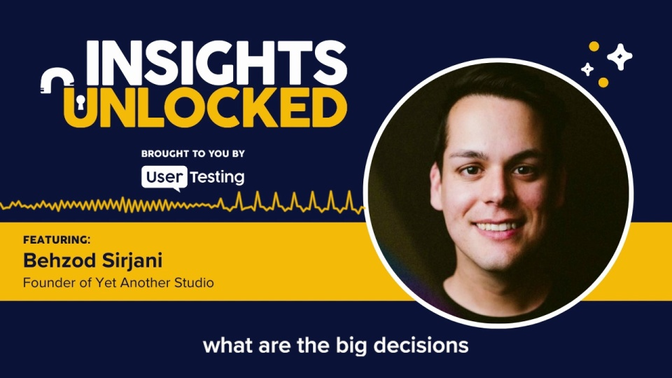
Helping people understand research
To help individuals who may be apprehensive about research methods, Beyzod advises starting with plain language and practical examples. It is like playing “Wheel of Fortune,” he said, where you have letters missing and you need to do some research to get another letter in the puzzle.
Every day, teams throughout an organization are trying to figure out better ways to help serve their customers. And they are pursuing that goal and making decisions with imperfect or incomplete information. But “research is a process of systematically and rigorously gathering that evidence so that you can be more confident in those decisions,” Behzod said.
Measuring research impact
Beyzod emphasizes that measuring the impact of research depends on the organization and its goals. He cautions against simply counting research activities (e.g., the number of surveys, tests or interviews conducted) and suggests focusing on whether research has positively influenced outcomes such as closing deals, improving customer success, or making better product decisions.
“One of the big problems is that people fall into this trap of doing research because they want to learn something, not because it's actually going to help the organization move forward,” Behzod said. “And so getting a pat on the back for talking to customers because you learned a thing that no one's going to do anything with is a terrible way to evaluate research.
“But it's hard to go from that world of ‘I did these things give me a gold star for doing it’ to because my team exists, everyone in the organization is more confident in how we make decisions. Our product launches are more successful. Our sales team is able to close faster. It just takes more work to actually measure those things.”
Diversity in research
The conversation touches on the importance of diversity in research. Beyzod suggests that when planning research, it's crucial to consider the attributes of the customer set being studied and be aware of potential biases. He advises against applying a one-size-fits-all approach to diversity and recommends tailoring research to specific situations.
“Then ask yourself, where am I potentially missing something? Where am I being blind? Where am I being biased? Where could I be taking a more holistic look?,” Behzod said. “I think the trap a lot of people fall into is they start with those questions of saying, How broad can I go? How can I make sure that I'm being inclusive?
And very often what you end up with is something that doesn't exactly represent your customer set. And ends up, I think at least in the way that the conversations happen to a lot of companies, feels almost performative at the cost of being authentic.”
Disarming resistance to research
To help clients or colleagues who may resist research, Beyzod suggests having them reflect on past decisions and how external factors influenced those decisions. This exercise can demonstrate the value of research in making more informed choices.
“And as you start to pull those threads, you realize that very often you can help them come to the conclusion that they were inspired by things outside of themselves,” Behzod said.
Pushing for decision-making
Beyzod uses the concept learned while at Slack of "pre-mortems" to encourage decision-making. This involves discussing potential risks and what failure might look like before starting a project. It helps set boundaries and encourages action rather than endless research.
